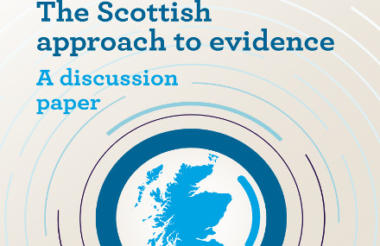Pippa Coutts, from the Alliance for Useful Evidence, and Jenny Brotchie, from Carnegie UK Trust, argue that the Scottish experience to developing participative services highlights the key role for the community and voluntary sector across the UK as both creators and champions of evidence.
Just before Christmas the ‘care crisis’ hit headlines again. For many working in the third sector the storm behind the headlines is something they are all too acutely aware of: rising demand against a backdrop of squeezed resources. A seemingly impossible context particularly when you are trying to improve lives at the same time.
Do more preventative, people focused services hold the key?
Catalysed by some of these challenges, across the UK we have seen calls for, and shifts towards, more preventative and holistic public services that better support people to lead independent and fulfilled lives. See, for example, the emphasis on prevention and partnership in NHS England’s Five Year Forward Strategy.
Calls for change from within the voluntary and community sector are often particularly strong – see the essays: Making Good: The Future of the Voluntary Sector.
How do we make this shift a success?
If this shift is to be successful, the role of evidence is critical: that is understanding what works for who, when and how?
In some areas good evidence on these questions exists but it isn’t always widely accessible. In other areas we need more research and there are emerging challenges to be worked through. For example, what does robust co-produced research look like? How do we aggregate and make sense of diffuse data on individual outcomes and make best use of people’s stories? How can we best support citizens and communities to produce and consume evidence?
These are all questions which are raised in the new discussion paper The Scottish Approach to Evidence launched by the Alliance for Useful Evidence and the Carnegie UK Trust. While the paper focuses on Scotland, we think these challenges are universal and apply to anyone working to improve lives in a preventative, holistic, people-centred way.
Developing a strong and accessible evidence base
The discussion paper argues that there is a distinctly Scottish Approach to policy that emphasises participative, people-centred policies, but that a complementary approach to evidence needs to be developed to serve this policy trend.
We set out 5 steps that we think cross sectoral partners need to take to get there:
1. Strengthen the understanding and use of the outcomes approach at national and local level. Outcomes approaches are common in the charity sector in the UK, and in jurisdictional governments of Scotland, Northern Ireland and Wales. Developing measures to assess final outcomes is often hard to do and there is a definite role for the third sector in collaboratively producing this evidence.
2. Build a strong evidence base for more participative approaches to public services. There is a need for the evidence base to keep pace with policy shifts towards participation and prevention.
3. Develop robust and appropriate methodologies in particular co-produced research (for which currently there is limited evidence). There is an opportunity to develop robust methodologies for gathering and using evidence appropriate to participative policies and practices.
4. Help decision-makers, at all levels, identify and use a mix of high-quality evidence. We need to pay attention to evidence quality when it comes to evidence that’s appropriate in participative policy and practice and at the same time is being used by a growing pool of evidence-consumers.
5. Learn from each other: Developing a suitable evidence base is a shared cross-sectoral challenge and cross-jurisdictional challenge.
In our view the third sector will be absolutely vital to achieving these steps.
As the Carnegie UK Trust’s InterAction research highlights, charities are important knowledge creators. Many are already delivering participative, enabling public services. Most have a strong connection to the people and communities that they work with. And, as we know, charities are often willing and able to test out innovative ways of working and adapt quickly to changing needs. The challenge will be to bring together the knowledge of charities, academics and public sector partners to build and make accessible a strong associated evidence base. We know collaborations of this nature can be challenging and often frustrating.
We need leaders to make a difference. We need evidence champions, opinion leaders, and role models to be messengers for the importance of the evidence in developing outcomes-focussed services. The Alliance for Useful Evidence has a network of over 3000 allies and is developing the role of evidence champions, people who are generating and using evidence in their practice, and who are ready to spread the message about its importance across the sector.
We hope this paper highlights the opportunities to put the third sector and people it serves at the heart of developing evidence of value not just to stakeholders in Scotland but across the UK and beyond.
Follow the Alliance at @A4Evidence and Jenny Brotchie at @Jenny_Carnegie.









